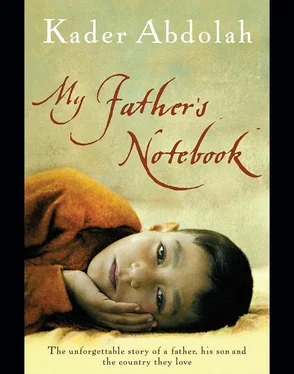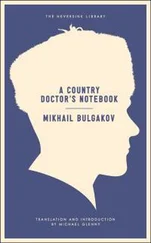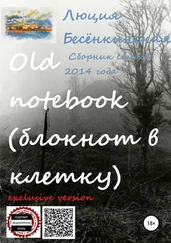That was a lie, because at that very moment Akbar was lying ill in bed. Tina had deliberately stood with her back to Akbar so he wouldn’t notice that she was talking to Ishmael, but he sensed that she was hiding something. He struggled to his feet, walked over to Tina and signed, “Who’re you talking to?”
“Our next-door neighbour,” she replied.
Akbar could tell that she was lying.
“Is it Ishmael?” he signed, and he began to say out loud, “Ismaa Ismaa Ismaa Agggaaa Aga Akkekebaaraa.”
“Tina!” Ishmael yelled into the receiver. “Is that Father?”
Akbar grabbed the phone and started telling him Golden Bell’s story in a trembling voice: “I I I crrrr sh sh sh is gogogo I I I Akka am iiin bedbedddd ohohoh shop shop is clo sh sh sh is gogogo oh nonono.” Then he handed the phone back to Tina, wiped away his tears and went back to bed.
Sobbing, Tina told Ishmael the truth. She told him that Golden Bell was in prison, that after six months they’d finally been given permission to visit her once a month, that Akbar had collapsed by the cedar trees and the neighbours had carried him home on their shoulders.
• • •
Akbar went back to his shop, but he had trouble working.
“My head doesn’t feel right,” he told Tina. “I keep weaving the wrong flowers into the carpets I’m mending.”
“You just need to concentrate. If you make mistakes, we won’t earn any money. Go to the shop and work calmly and quietly. It’ll all come back to you.”
A month later, when he didn’t come home from work one day, Tina went looking for him. She found him lying on the carpet with his cuneiform notebook beside him. He had fainted. Tina ran to the bakery. The baker immediately called an ambulance and Akbar was taken to the hospital. “Your husband needs to rest,” the doctor told Tina. “Work will kill him.”
After a week, Akbar was released from the hospital. He now walked with a cane.
He hated sitting around the house, so one morning he shuffled to the shop with his cane, unlocked the door, moved his chair over to the window, sat down and tried to do a bit of work. In the afternoon he walked to the cemetery and sat by the grave of his nephew Jawad. From there he looked up at Saffron Mountain. When evening came, he went back home. “Where have you been?” Tina burst out. “What will I do if you fall?”
He went in the house, picked up a pen and crossed off another day on the calendar. Then he counted the number of days left before they could visit Golden Bell.
On visiting days he got up at the crack of dawn, grabbed his cane and walked the six miles to the prison on his own.
Tina used to beg, “Don’t do it. It isn’t good for you. Why don’t you take the bus, like I do?”
But Akbar never listened. “It makes me feel better. You don’t have to worry about me. I don’t walk fast. I stop and rest along the way.”
When he got to the prison, he usually sat in the teahouse on the square until the bus arrived with its load of visitors. The moment he saw Tina, he stood up and went over to meet her.
Akbar always took along a few skeins of yarn that he’d dyed himself, because Golden Bell was knitting socks, mittens and a warm robe. Since she was ruining her eyes in her dark cell, Tina took her fresh vegetables and lentils. On a previous visit, Golden Bell had asked them to bring her walnuts and dried figs.
“What do you need those for?” Tina said. “You don’t get much exercise, so don’t eat too many figs.”
“Don’t worry, Mother, I won’t.”
And so, the months and the years went by. The Berlin Wall fell and Ishmael ended up in the Netherlands, in a house in the polder. He had a place to sit and a window through which he could look out over his past.
These were difficult years, but he wasn’t sorry he’d escaped or made the political choices he had. He’d learned a lot, he’d had all kinds of experiences and he’d even enjoyed life. Golden Bell’s imprisonment, however, was a constant source of pain and worry. He also felt terribly guilty.
It was winter. Early one morning Akbar grabbed his cane and set off for the prison.
In the spring or summer he always ran into farmers walking out to their fields to work the land. “Salaam, Aga Akbar, how are you?”
“Better.”
“And your daughter?”
“Fine. She knitted me a cap and some mittens for the winter. She’s even weaving a carpet. She says that when it’s done, she’s going to sit on her magic carpet and fly away from the prison,” Akbar signed. “Fly away,” he repeated with a laugh, and he waved his cane in the air.
In the spring he usually sat down, drank a cup of tea with the farmers, rested for a while and then walked on.
But in the winter it was difficult. He couldn’t stop to rest, because it was too cold. He didn’t mind, though. He spent the whole time talking to Golden Bell in his head and that kept him from feeling the cold in his feet.
On his last visit he’d noticed that Golden Bell was getting old. Her face was lined and her shoulders were slightly stooped.
Maybe he was mistaken and they weren’t really stooped, but he signed to Tina anyway, “I’ve noticed that Golden Bell has a stoop. Have you noticed it, too?”
“No, but it must be from all that sitting. With four or five girls crammed into one tiny cell, there’s not much room for her to move around. S he’ll have to do a lot of walking when she gets out. That’ll straighten her back.”
“When is she going to get out?”
“I don’t know, Akbar. They don’t tell us things like that. Maybe soon, maybe not for a long time.”
“How long is ‘a long time’?”
“Oh, honestly, Akbar, how would I know? Maybe so long that I won’t be able to walk any more.”
He felt saddened by her answer.
As he walked towards the prison, Akbar pondered her words. Long, Tina had said, maybe so long that she wouldn’t be able to walk any more. By that time, Akbar thought, I’ll probably be dead.
Golden Bell’s hair was turning prematurely grey. But she was clever and strong, so Akbar hoped she’d survive for years. When she was finally released, she’d still have a long life, she’d still be able to work and maybe even have children. Akbar felt sure Golden Bell would manage all right, since she’d read so many books.
Tina didn’t want Akbar to feel so sad. She told him that everything would be OK. “If you suffer from too much sadness,” she said, “you’ll fall down again and die. And if you die, you won’t be able to visit Golden Bell any more and then Golden Bell will cry in her cell for ever.”
Tina also said that if he died he’d never see Ishmael again, either. “Maybe we’ll all go and visit Ishmael when Golden Bell gets out of prison,” Tina said. “We’ll take a plane!”
Who knows? Maybe one day they would.
“Where does Ishmael live?” Akbar asked.
“He lives in a country that doesn’t have any mountains,” Tina said. “It’s always cloudy there, the wind is always blowing and he lives at the bottom of a sea.”
“At the bottom of a sea? A sea?”
“Yes,” Tina said. “They pumped out all the water. Now there are trees growing on what used to be the bottom of the sea and cows grazing on the grass.”
It didn’t make sense to Akbar, but that’s where Ishmael lived.
As he plodded on, Akbar thought about the fact that Golden Bell was more patient than Ishmael. She explained things to him with endless patience.
Ishmael always talked to him about big things — the sky, the stars, the earth, the moon — but Golden Bell always talked to him about little things.
Once she picked up a stone. “There are tiny things moving around inside,” she said.
Читать дальше












